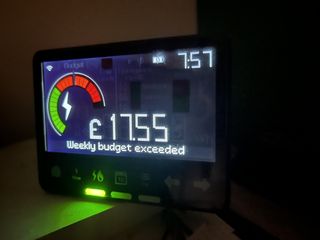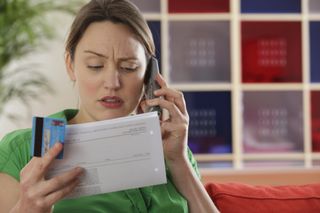Nearly eight million struggling to pay bills: what help can you get?
The help and steps you can take if you or someone you know is struggling to pay the bills


Around 7.8 million people are finding it a ‘heavy burden’ to keep up with bills – a third more than in the midst of the pandemic in 2020.
The research by the Financial Conduct Authority (FCA) comes as UK households face inflation at more than 10%, higher food prices, rising energy bills and a potential recession.
Sheldon Mills, Executive Director, Consumer and Competition at the FCA said: “Our research shows people up and down the country are struggling to keep up with their bills.
“If you are facing financial difficulty, you don’t need to struggle alone. There is free debt advice available, and we have told firms that they must work with their customers to solve any problems with payment”.
If you need help paying your bills – here’s some of the help that’s available and how to get it.
Get the Government support you’re entitled to
- More than 8 million households are due to get the second instalment of the Government’s £650 low income cost of living payment – worth £324 in November.
- Pensioners will also receive an additional £300 from November on top of the Winter Fuel Payment as part of the Government cost of living package.
- Around 8 million pensioner households will get an extra £300 payment. This will be paid to those who get the Winter Fuel Allowance and made as an additional one off payment.
- £150 Disability payment – this is being made to around six million people who claim certain disability benefits including Disability Living Allowance and Attendance Allowance.
- Around 1.3 million households are missing out on Universal Credit payments. Here’s how you can check if entitled to Universal Credit.
Get help with energy bills

- From October households across England, Scotland and Wales will start to benefit from the £400 energy bill discount. Payments will be made at the rate of £66 a month in October and November and then £67 a month from December to March. Depending on your supplier – this may either mean a reduction in your monthly direct debit or a credit to your bank account.
- Some suppliers including Octopus Energy and Ovo are offering customers £100 to cut energy use by using appliances like washing machines and dishwashers overnight in a bid to save energy.
- If you’ve got an economy 7 meter – you could already benefit from cheaper electricity bills by switching to night time use.
- Most energy suppliers also offer some form of help or hardship fund. In most cases you’ll need to be an existing customer to qualify – however with British Gas this isn’t the case. Octopus is also offering 10,000 customers a free electric blanket.
- And it’s worth remembering under terms and conditions set out by the energy regulator Ofgem – suppliers must help you. If you are finding it hard to meet bill payments or feel your energy provider has increased your monthly direct debit payments by an unaffordable amount – get in touch with them. They can help in various ways – including working with you to offer a reduced payment plan or even freezing payments temporarily - helping you cut energy costs.
Get help with your mortgage payments
While Government help with your mortgage under the Support for Mortgage Interest scheme is limited to those claiming certain benefits and only comes in the form of a repayable loan – not free cash – you can still ask your lender for help.
The Financial Conduct Authority wrote to 3,500 mortgage lenders back in June asking them to ‘treat borrowers fairly’ and show ‘forbearance’ to those in financial difficulty.
Look After My Bills Newsletter
Get the best money-saving tips, tricks and deals sent straight to your inbox every week. Make sense of your money in partnership with The Money Edit.
In practical terms this means lenders should offer a range of options – which can include offering struggling borrowers a temporary mortgage payment holiday. Any change to payments would need to be agreed with your lender but with a mortgage payment holiday - this can mean temporarily stopping payments for up to a year.
You will need to make up the payments plus interest further down the line or have this added on your mortgage.
Other options can also include switching from a repayment to interest only mortgage to ease monthly bills or extending your mortgage term. While both these options will cut payments in the short term – they may mean you’ll pay more on your mortgage in the long run.
All options must be agreed with your lender first.
Get help with food bills

Food prices have been rising at faster than the rate of inflation with the average household now expected to have to fork out an extra £643 over the next year even if they stick to buying the same food.
You may be able to get help from your local food bank. The Trussell Trust is the largest of these – although there are many local community food banks or ones run by local churches. In most cases you’ll need to get a referral from your GP, social worker or Jobcentre before you’ll be given a voucher to exchange for supplies.
Freeze memberships and pause payments
If you’re part way through a contract, membership or subscription and struggling to afford your monthly payments – contact the company.
Some gyms for example may allow you to temporarily ‘pause’ payments or freeze your membership – and some subscriptions may run on a 30 day rolling basis so you only need give a month’s notice to cancel.
Go through your bank and credit card statements to look for any other outstanding subscriptions, contracts or recurrent payments you may have forgotten about – and can cancel once your contract ends.
And check you don’t have ‘auto-renewal’ set up on any insurance policies. This can apply to home, car, breakdown cover or even your antivirus computer software - these payments can drain your account if you forget to cancel or shop around.
Get help with insurance costs
When it comes to help from your home or motor insurer – it’s worth giving them a call to see if there’s any changes that can be made to streamline the policy and save money.
While paying for extras like accidental damage cover or home emergency cover on your home policy – means extra cover - if you’re strapped for cash it’s more important to protect your bricks and mortar and the bulk of your contents.
More than two million adults have cancelled life policies due to the cost of living crisis according to GoCompare – however there’s no ‘cash in’ value with these policies so you won’t get your money back.
A better option is to speak to your insurer as you may be able to reduce your cover and payments or even temporarily suspend payments for a short time without losing cover.
Get help with mobile and broadband bills
Your mobile and broadband provider must now let you know when your current deal is due to end. This is under rules from the communications regulator Ofcom and they should contact you between 10 – 40 days before your contract ends – giving you time to shop around.
If you’re claiming certain benefits you may be eligible to get a discounted broadband deal. Uswitch found two in three financially vulnerable households were unaware that low income broadband tariffs exist. It says around ten million households could save around £234 a year this way.
And if you don’t qualify for these discounted deals - finding the best broadband deal doesn’t have to be time consuming or complicated but bear in mind once you’re locked into a contract – you’ll usually need to pay penalty fees to get out of it.
How haggling can save you money

It’s not guaranteed help – but calling your existing provider with anything from home or motor insurance to breakdown cover and having a haggle can cut bills.
Trick is to make sure you’re coming up to the end of your policy or contract and then take the ‘thinking of leaving us’ option on the automated system. With mobiles and broadband – it often pays to ask for ‘disconnections’.
These are the people with the power to authorise the biggest discounts and can make the difference between keeping you a customer or letting you go.
Get help if debts are spiralling out of control
If no amount of cutting back, switching supermarkets and providers and shopping around will help and you’re having sleepless nights about money worries – or falling behind on payments - it’s worth seeking free professional help.
You can get free help and advice from organisations including your local Citizens Advice, StepChange and National Debtline.
All these organisations have trained advisors who will explain your options and offer practical advice on the way forward.
As these organisations themselves are under pressure right now with a huge increase in callers – it may take more time than usual to get through.

Sue Hayward is a personal finance and consumer journalist, broadcaster and author who regularly chats on TV and Radio on ways to get more power for your pound. Sue’s written for a wide range of publications including the Guardian, i Paper, Good Housekeeping, Lovemoney and My Weekly. Cats, cheese and travel are Sue’s passions away from her desk!
-
 Three energy firms pay £8m in switching compensation - has your provider paid out?
Three energy firms pay £8m in switching compensation - has your provider paid out?More than 100,000 customers have received compensation after changing providers, but is now a good time to switch energy suppliers?
By Tom Higgins Published
-
 Save £300 on your supermarket shop with cashback accounts
Save £300 on your supermarket shop with cashback accountsBanks, credit card companies and cashback sites are all offering cashback on your supermarket shop, but can you use them all to max out your savings?
By Vaishali Varu Published
-
 Three energy firms pay £8m in switching compensation - has your provider paid out?
Three energy firms pay £8m in switching compensation - has your provider paid out?More than 100,000 customers have received compensation after changing providers, but is now a good time to switch energy suppliers?
By Tom Higgins Published
-
 HMRC tax credit renewal packs: act quickly to avoid losing benefit payments
HMRC tax credit renewal packs: act quickly to avoid losing benefit paymentsHouseholds receiving tax credits will be asked to confirm their details to ensure they continue to receive their entitlement. Here’s everything you need to know to make sure you don’t miss out on up to £3,480 a year
By Tom Higgins Published
-
 Mobile provider rewards: how to earn up to £700
Mobile provider rewards: how to earn up to £700Your phone could be the key to unlocking hundreds of pounds worth of discounts and freebies that you don’t even know about. We reveal which mobile providers offer the best rewards
By Vaishali Varu Published
-
 How much do cooking appliances cost to run?
How much do cooking appliances cost to run?Energy-saving cooking tips from the Energy Saving Trust
By Katie Binns Published
-
 Virgin Media leaves thousands without broadband: are customers entitled to compensation?
Virgin Media leaves thousands without broadband: are customers entitled to compensation?Tens of thousands of Virgin Media customers were hit by broadband outages yesterday. We explain your rights if your broadband goes down
By Katie Binns Published
-
 Broadband switching service delayed - how it will eventually work and why it’s crucial to switch
Broadband switching service delayed - how it will eventually work and why it’s crucial to switchA broadband switching service designed to make it easier to change to a cheaper or faster deal has been delayed. We explain how you can still avoid huge increases to your monthly internet bill
By Katie Binns Published
-
 Heat pumps: why you can claim a £5,000 government grant for longer
Heat pumps: why you can claim a £5,000 government grant for longerWhy you now have more time to apply for a government grant towards getting a heat pump in your home
By Sue Hayward Published
-
 British Gas cuts energy bills by £15 for prepayment meter customers from April
British Gas cuts energy bills by £15 for prepayment meter customers from AprilOne million British Gas customers on energy prepayment meters will save around £15 as British Gas cuts its penalty three months early
By Sue Hayward Published